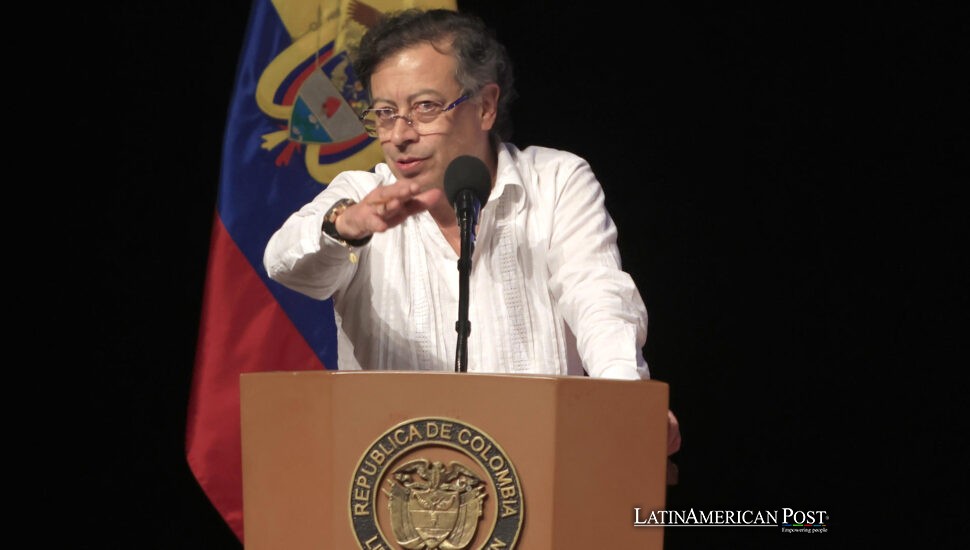Colombia’s Referendum Push: Shortcuts, Populism, and Legislative Tensions

Colombian President Gustavo Petro’s government intends to force through twelve stalled reforms by submitting them to a popular referendum, sidestepping congressional debate. While these social proposals reflect high public appeal, critics warn they weaken democratic safeguards and embolden populist impulses.
The Referendum as a Shortcut to Power
On May 1, the Petro administration plans to present twelve referendum questions before the Senate, demanding that lawmakers approve a nationwide consultation on reforms that have languished in Congress. Among these proposals are policies on labor rights, such as limiting daytime work hours, guaranteeing 100% overtime pay on weekends, and improving protections for domestic employees. Armando Benedetti, Colombia’s Minister of the Interior, along with Antonio Sanguino, Labor Minister, presented the questions at a press conference. This revealed what seems like government dissatisfaction with the slow progress of debate in Congress.
Some say that going around the legislative branch by referendum shows an antidemocratic action. In principle, referendums can strengthen direct democracy by consulting citizens on important issues. Yet in practice, Petro’s administration stands accused of leveraging populist slogans—like shorter workdays or guaranteed security benefits for gig workers—to push through sweeping changes without the usual checks and balances. Opponents maintain that such an approach effectively sidelined nuanced congressional negotiations on topics as varied as labor law, social benefits, and pension structures for rural communities.
The government’s impetus seems clear: to capitalize on the popular resonance of worker-oriented proposals. By posing them as simple yes-or-no questions, the administration frames reforms as moral imperatives rather than complex legislation requiring thorough debate. If each question secures more than 50% approval—provided a requisite quorum of roughly 13.7 million voters participates—these proposed measures would gain legal force. Advocates support the direct approach. Citizens of Colombia with unstable employment require fast action from their government regarding promises of social justice.
Such a procedure could weaken the legislature. One job of Congress is to examine bills and correct them, say authorities. This finds surprise outcomes. The voting form needs simple answers. Problems sometimes require a gradual deployment plan or intergroup contracts. Opponents fear that skipping this process for the sake of political expediency sets a worrying precedent, potentially fueling future leaders to bypass elected representatives whenever public opinion can be swayed by emotive slogans.
Analyzing the Questions: Practical Reforms or Populist Lures?
These concepts appear to align perfectly with social justice objectives when examined superficially. Gig workers have consistently reported that their unstable employment situation prevents them from receiving fundamental benefits, including health coverage and workplace injury compensation. Domestic workers who are predominantly female do not have formal protections, which exposes them to low pay and discriminatory practices. Government plans include better circumstances for disadvantaged people. They plan to do this through standard social security payments, and a pension fund is also planned for small farmers.
The way to achieve these plans is debated. Politicians from differing parties believe each option involves problems. This makes a simple decision problematic. Large-scale financial support for microenterprises combined with strict indefinite contracts can undermine job creation when not aligned with economic conditions. Employers might hesitate to hire new staff because more expensive Sunday labor would increase their operational costs. Under standard practices, these issues would receive analysis during committee hearings with expert input followed by debates and revisions. The simple yes-or-no choices presented in a referendum fail to allow for detailed analysis, which can lead to unexpected costs and potential loopholes.
Critics also highlight the potential for populism in packaging these reforms: The government depicts Congress as a barrier to necessary progress by presenting these reforms as urgent moral solutions to historical wrongs. Experts caution that this particular rhetorical tactic strengthens the story of an executive heroically confronting powerful established elites. Indeed, public statements from officials have hinted that if lawmakers fail to pass key reforms quickly, “the people will have their say.” While such language resonates with frustrated voters, many fear it signals an erosion of the institutional architecture that underpins representative democracy.
Bypassing Congress: Antidemocratic Means or Lasting Legacy?
The democratic procedure question lies at the center of the dispute. The legislative branch, in a representative democracy, has the job to examine plus improve important policy suggestions. It makes certain that less common opinions receive attention and that changes based on information find a place in the plans. The Petro administration bypasses disagreement from its legislative majority through a referendum. Those who disagree claim the reforms require careful discussion in Congress if they provide advantages and practical solutions.
About the referendum, supporters state that Congress displayed a lack of support, even opposition, for the government’s reform plan. They say corporate lobbying stopped or weakened important bills. The established political group places its own needs above the general public’s. Through popular consultation, they believe a correction of this unequal situation will happen and will return power to average citizens. They point out that each question stems from widespread requests for fairness. The shifts match what the public wants, specifically from communities that faced being pushed aside for a long time.
Yet the approach sets a potentially corrosive precedent. If a referendum can override parliamentary debate in the name of popular support, future leaders might exploit the method to propose even more controversial measures. Experts warn these actions confuse proper citizen involvement with excessive populism. Some fear that not following regular legal checks may damage the stability of Colombia’s government. This practice lets popular administrations implement important policy changes with minimal oversight.
But the success of the reforms depends on over 13.6 million Colombians voting. Because many citizens do not often vote, getting sufficient voters to support the referendum may prove difficult. Those who support it will describe the reforms as essential to Colombia’s continuing pursuit of fairness. Those who oppose it will probably show them as unrealistic or irresponsible promises intended to avoid the difficult choices faced by leaders.
Also Read: Mexican Corridos: Ceasing Violence Needn’t Silence Artistic Expression
In the following weeks, Colombian senators will decide if they approve the referendum proposal. This action passes the final decision to the voters. Public discussion becomes more intense. It shows a common problem in Latin American politics. This problem is the equilibrium between direct citizen involvement and legislative democracy’s protections. Should the referendum proceed, it will test whether powerful appeals to worker-friendly reforms can galvanize enough citizen support to reshape Colombia’s labor landscape—and whether such a tactic strains the country’s democratic mechanisms to their breaking point.




